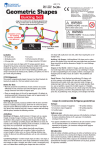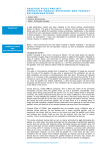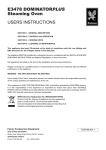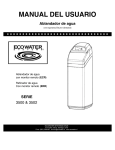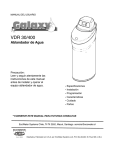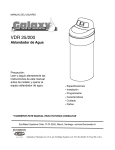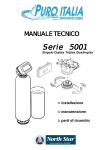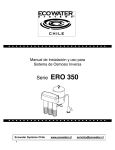Download EcoWater EASF1 Owner`s manual
Transcript
OWNER’S MANUAL How to install, operate and maintain your EcoWater Systems Automatic Sediment Filter Model EASF1 EcoWater Systems LLC P.O. Box 64420, St. Paul, MN 55164-0420 7301805 (Rev. A 3/12/08) Table of Contents Before You Start . . . . . . . . . . . . . . . . . . . . . . . . . . . . . . . . . . . . . . . . . . . . . . . . . . . . . . . . . . . . . . . . . . . . . . . . . . . . 2 Warranty . . . . . . . . . . . . . . . . . . . . . . . . . . . . . . . . . . . . . . . . . . . . . . . . . . . . . . . . . . . . . . . . . . . . . . . . . . . . . . . . . . 3 Unpacking Dimensions . . . . . . . . . . . . . . . . . . . . . . . . . . . . . . . . . . . . . . . . . . . . . . . . . . . . . . . . . . . . . . . . . . . . .4 How the Automatic Sediment Filter Works . . . . . . . . . . . . . . . . . . . . . . . . . . . . . . . . . . . . . . . . . . . . . . . . . . . . . . . . .5 Specifications . . . . . . . . . . . . . . . . . . . . . . . . . . . . . . . . . . . . . . . . . . . . . . . . . . . . . . . . . . . . . . . . . . . . . . . . . . . . . . .5 Planning the Installation . . . . . . . . . . . . . . . . . . . . . . . . . . . . . . . . . . . . . . . . . . . . . . . . . . . . . . . . . . . . . . . . . . . . .5-6 Installation Location . . . . . . . . . . . . . . . . . . . . . . . . . . . . . . . . . . . . . . . . . . . . . . . . . . . . . . . . . . . . . . . . . . . . . . .5 Always Install the Filter Upright Reversing the Faceplate Mounting Bracket . . . . . . . . . . . . . . . . . . . . . .6 Installation Requirements . . . . . . . . . . . . . . . . . . . . . . . . . . . . . . . . . . . . . . . . . . . . . . . . . . . . . . . . . . . . . . . . . . . . . 7 Air Gap Requirements . . . . . . . . . . . . . . . . . . . . . . . . . . . . . . . . . . . . . . . . . . . . . . . . . . . . . . . . . . . . . . . . . . . . .7 Valve Drain Requirements . . . . . . . . . . . . . . . . . . . . . . . . . . . . . . . . . . . . . . . . . . . . . . . . . . . . . . . . . . . . . . . . . .7 Grounding Information . . . . . . . . . . . . . . . . . . . . . . . . . . . . . . . . . . . . . . . . . . . . . . . . . . . . . . . . . . . . . . . . . . . . .7 Installation Instructions . . . . . . . . . . . . . . . . . . . . . . . . . . . . . . . . . . . . . . . . . . . . . . . . . . . . . . . . . . . . . . . . . . . . 8-11 Installation Using Compression Fittings . . . . . . . . . . . . . . . . . . . . . . . . . . . . . . . . . . . . . . . . . . . . . . . . . . . . . 8-9 Installation Using Soldered Copper Fittings . . . . . . . . . . . . . . . . . . . . . . . . . . . . . . . . . . . . . . . . . . . . . . . . . 9-10 Installation Using Threaded Pipe & Fittings . . . . . . . . . . . . . . . . . . . . . . . . . . . . . . . . . . . . . . . . . . . . . . . . . . . 10 Install Drain Hose Check For Leaks Install Battery Optional AC Adaptor . . . . . . . . . . . . . . . . . . . . . 11 Programming the Electronic Controller . . . . . . . . . . . . . . . . . . . . . . . . . . . . . . . . . . . . . . . . . . . . . . . . . . . . . . . .12-13 Power Up Manually Start a Sediment Flush . . . . . . . . . . . . . . . . . . . . . . . . . . . . . . . . . . . . . . . . . . . . . . . . .12 Normal Operation LCD Backlight . . . . . . . . . . . . . . . . . . . . . . . . . . . . . . . . . . . . . . . . . . . . . . . . . . . . . . . . .12 Setting Number of Days Between Automatic Sediment Flushes . . . . . . . . . . . . . . . . . . . . . . . . . . . . . . . . . . . .13 Time of Day When Flush Occurs . . . . . . . . . . . . . . . . . . . . . . . . . . . . . . . . . . . . . . . . . . . . . . . . . . . . . . . . . . . .13 Low Battery Indication Battery Replacement . . . . . . . . . . . . . . . . . . . . . . . . . . . . . . . . . . . . . . . . . . . . . . . .13 Routine Maintenance . . . . . . . . . . . . . . . . . . . . . . . . . . . . . . . . . . . . . . . . . . . . . . . . . . . . . . . . . . . . . . . . . . . . . . . .14 Cleaning the Filter Screen . . . . . . . . . . . . . . . . . . . . . . . . . . . . . . . . . . . . . . . . . . . . . . . . . . . . . . . . . . . . . . . . .14 Troubleshooting Guide . . . . . . . . . . . . . . . . . . . . . . . . . . . . . . . . . . . . . . . . . . . . . . . . . . . . . . . . . . . . . . . . . . . . . . 15 Disassembly of Solenoid Disassembly of Valve . . . . . . . . . . . . . . . . . . . . . . . . . . . . . . . . . . . . . . . . . . . . . .15 Repair Parts . . . . . . . . . . . . . . . . . . . . . . . . . . . . . . . . . . . . . . . . . . . . . . . . . . . . . . . . . . . . . . . . . . . . . . . . . . . . . . 16 Before You Start Read this entire manual before installing and using your Automatic Sediment Filter. Then, obtain all the materials and tools you will need to make the installation. Follow all steps exactly and in order to correctly install. The Automatic Sediment Filter must only be installed vertically, with the head up and the sump down. It will not operate properly if installed horizontally or at an angle. Check local plumbing, electrical and sanitation codes. You must follow their guides as you install the system. Use only lead-free solder and flux for all sweat-solder connections, as required by federal codes. Maximum operating pressure: 100 psi. Maximum operating temperature: 120 °F. Avoid installing in direct sunlight. Excessive sun heat may cause distortion or other damage to non-metallic parts. For cold water use only. Do not install on a hot water line. Do not use this system to treat water that is microbiologically unsafe or of unknown quality without adequate disinfection before or after the system. Keep solvents and sprays away from the clear sump housing material. Surface cracking and failure can result. European Directive 2002/96/EC requires all electrical and electronic equipment to be disposed of according to Waste Electrical and Electronic Equipment (WEEE) requirements. This directive or similar laws are in place nationally and can vary from region to region. Please refer to your state and local laws for proper disposal of this equipment. In the state of Massachusetts: The Commonwealth of Massachusetts plumbing code 248-CMR shall be adhered to. A licensed plumber shall be used for this installation. Questions? Call Toll Free 1-800-86 WATER, Monday - Friday, 8 am - 8 pm CST. 2 Warranty LIMITED WARRANTY EcoWater Systems LLC Advantage Warranty Automatic Sediment Filter Congratulations! You have just purchased the highest quality Automatic Sediment Filter on the market. To register your warranty, complete the enclosed Warranty Registration Card and mail it within 30 days of purchase. To whom is this warranty extended? EcoWater Systems LLC warrants its products to the original owner and guarantees that the products, when properly installed and maintained, will be free from defects in materials and workmanship from the original date of installation. How does my warranty work? If, during the respective warranty period, a part proves, after inspection by EcoWater, to be defective, EcoWater will, at its sole option, repair or replace that part at no charge, other than normal shipping, installation or service charges. What is covered by the warranty? EcoWater Systems LLC guarantees that, for a period of THREE YEARS, the Automatic Sediment Filter will be free of defects in materials and workmanship and will perform its proper function. How do I obtain warranty service? Should you need service, your local, independent EcoWater Dealer is only a phone call away. PHONE:____________________________________________________ To obtain warranty service, notice must be given, within thirty (30) days of the discovery of the defect, to your local EcoWater Systems dealer. General Provisions The above warranties are effective provided the Automatic Sediment Filter is operated at water pressures not exceeding 100 psi, and at water temperatures not exceeding 120°F; provided further that the Automatic Sediment Filter is not subject to abuse, misuse, alteration, neglect, freezing, accident or negligence; and provided further that the Automatic Sediment Filter is not damaged as the result of any unusual force of nature such as, but not limited to, flood, hurricane, tornado or earthquake. EcoWater Systems LLC is excused if failure to perform its warranty obligations is the result of strikes, government regulation, materials shortages, or other circumstances beyond its control. THERE ARE NO WARRANTIES ON THE AUTOMATIC SEDIMENT FILTER BEYOND THOSE SPECIFICALLY DESCRIBED ABOVE. ALL IMPLIED WARRANTIES, INCLUDING ANY IMPLIED WARRANTY OF MERCHANTABILITY OR OF FITNESS FOR A PARTICULAR PURPOSE, ARE DISCLAIMED TO THE EXTENT THEY MIGHT EXTEND BEYOND THE ABOVE PERIODS. THE SOLE OBLIGATION OF ECOWATER SYSTEMS LLC UNDER THESE WARRANTIES IS TO REPLACE OR REPAIR THE COMPONENT OR PART WHICH PROVES TO BE DEFECTIVE WITHIN THE SPECIFIED TIME PERIOD, AND ECOWATER IS NOT LIABLE FOR CONSEQUENTIAL OR INCIDENTAL DAMAGES. NO ECOWATER DEALER, AGENT, REPRESENTATIVE, OR OTHER PERSON IS AUTHORIZED TO EXTEND OR EXPAND THE WARRANTIES EXPRESSLY DESCRIBED ABOVE. Some states do not allow limitations on how long an implied warranty lasts or exclusions or limitations of incidental or consequential damage, so the limitations and exclusions in this warranty may not apply to you. This warranty gives you specific legal rights, and you may have other rights which vary from state to state. This warranty applies to consumer-owned installations only. 3 Unpacking INSPECT SHIPMENT The Automatic Sediment Filter is shipped complete in one carton. Remove all items from the shipping carton and check against the packing list below. Packing List Mounting Bracket & Screws Filter Assembly 10 ft. Drain Hose Hose Clamp 9V Battery FIG. 1 Dimensions Inlet & Outlet 1” NPT threaded 15" 10" 5-1/4" 4-1/8" 4 FIG. 2 How the Automatic Sediment Filter Works The EcoWater Automatic Sediment Filter is designed to be plumbed into a home’s incoming water supply pipe, where it will capture particles of sediment from the water and periodically flush them down the drain. The unit has an electronic control that counts down the days until the next automatic flush of collected sediment particles. The number of days is programmable. The electronic controller runs on a 9 volt battery. The controller will indicate when the battery needs to be replaced. An optional AC power adaptor (P/N 7302835) may also be purchased to eliminate the need for batteries. NOTE: This product is designed to reduce sand, grit, debris, pipe scale and other loose particulate matter. On water supplies that contain sticky sediment including mud, silt and clay, you may have to remove the sump and clean the screen periodically. Three sizes of filter mesh are available. A 60 micron filter is included with the ASF unit, and optional 100 or 150 micron filters can also be purchased (see spare parts list at the end of this manual). Specifications Rated Service Flow Rate 35 gpm (132 lpm) Water Pressure Limits (minimum / maximum) Water Temperature Limits (minimum / maximum) Inlet - Outlet 30 - 100 psi (207 - 689 kPa) 40 - 120 °F (5 - 49 °C) 1” NPT Planning the Installation INSTALLATION LOCATION To filter sediments from all household water, install the Automatic Sediment Filter on the household’s main incoming water pipe. The Automatic Sediment Filter Cold Water to House should be installed upstream from the water softener (if any), the water heater and all inside faucets. See diagram below. Untreated Water to Outside Faucets City Water Supply Hot Water to House Pressure Tank OR Automatic Sediment Filter Water Heater Water Softener Well Water Supply Well Pump FIG. 3 5 Planning the Installation ALWAYS INSTALL THE FILTER UPRIGHT To operate properly, the Automatic Sediment Filter must be installed with the sump pointed straight down. When possible, install the filter on a horizontal section of the household’s main incoming water pipe. If the available incoming main house water pipe runs vertically where you want to install the filter, buy 90° pipe elbows and plumb a detour, as shown in Figure 4. Allow enough space under the filter (6” minimum) to remove the sump (to clean or replace the filter screen). Allow enough space above the filter to remove the top cover (to change batteries, etc.), as shown in Figure 4. 10” 10" min. min. IN OUT House Water Supply Pipe Sump Pointed Straight Down REVERSING THE FACEPLATE / DISPLAY The Automatic Sediment Filter must be installed with the water flowing into the side of the filter marked IN. Remove the unit’s top cover and observe the IN and OUT markings. Depending on the direction of water flow and the viewing angle, the faceplate may need to be reversed (turned around to face the opposite direction) so that it does not end up against a wall or other obstruction. This can be done either before or after the filter is installed on the plumbing: 6” min. FIG. 4 Remove 2 screws and turn faceplate around, if necessary 1. Remove the top cover from the ASF by sliding it upward. 2. With a phillips screwdriver, remove the 2 screws holding the faceplate assembly to the filter head (See Figure 5). 3. Lift the faceplate assembly up and turn it around 180°, taking care not to pull on the wires between the electronic control board and the valve solenoid. 4. Lower the faceplate assembly into place on the opposite side of the head and reinstall the 2 screws. 5. Slide the top cover back onto the ASF and push it down to snap into place. FIG. 5 MOUNTING BRACKET 3" A metal bracket is included with the Automatic Sediment Filter to support the assembled filter and plumbing when necessary. It may be mounted to a wall or wall framing member with 2 screws (included), as shown in Figure 6. Mounting Bracket The 2 mounting bracket screws should be installed before the filter is installed on the plumbing. When installing the plumbing, be sure to put the bracket in position around the ASF before installing inlet and outlet fittings. The bracket can not be put on after the inlet and outlet fittings are installed. FIG. 6 6 Installation Requirements PLUMBING CODES VALVE DRAIN REQUIREMENTS All plumbing must be completed in accordance with national, state and local plumbing codes. Using the flexible drain hose (included), measure and cut to the length needed. Avoid drain hose runs longer than 10 feet. Make the valve drain line as short and direct as possible. In the state of Massachusetts: The Commonwealth of Massachusetts plumbing code 248-CMR shall be adhered to. A licensed plumber shall be used for this installation. If possible, avoid elevating the drain hose. This could reduce the effectiveness of the flush cycle, especially in a low pressure application. The drain must be capable of handling a flow of 5 to 10 gallons per minute, depending on the home’s water pressure. AIR GAP REQUIREMENTS The drain must be capable of handling the sediment being flushed from the filter. A drain is needed for sediment flush discharge water. A floor drain, close to the Automatic Sediment Filter, is preferred. A laundry tub, standpipe, etc. are other drain options. The valve drain hose must be secured in place, since drain water will be spraying from the end of the hose at a high rate during flush cycles. Leave an air gap of 1-1/2” between the end of the hose and the drain. This gap is needed to prevent backflow of sewer water into the Automatic Sediment Filter. Do not put the end of the drain hose into the drain. GROUNDING INFORMATION (for Installations on Metal Pipe) The house main incoming water pipe is often used to ground electrical outlets in the home. Grounding protects you from electrical shock. Installing the Automatic Sediment Filter may break this ground. To restore it, buy and install a #4 copper wire across the filter, tightly clamped at both ends, as shown below. CONNECTING VALVE TO DRAIN Ground Wire (not included) Drain Fitting Hose Clamp Valve Drain Hose IMPORTANT: Flow rate to drain can exceed 9 gpm at higher pressure. Be sure to secure drain hose properly and test. Drain grate with 1” dia. hole in center Clamp (2 not included) To drain point other than floor drain. Support tubing in place as needed. Aim end of drain hose toward center of drain. Tie or wire tubing in place. 1-1/2” air gap FIG. 7 1-1/2” air gap 1-1/2” air gap LAUNDRY TUB FLOOR DRAIN 7 STANDPIPE FIG. 8 Installation - Type A INSTALLATION USING COMPRESSION FITTINGS Optional Shutoff Valve (2) Apply at least 4 wraps of Teflon Tape Mounting Bracket may be used in all types of installations. Be sure to put it in position around the ASF before installing inlet and outlet fittings. WATER IN Nut (2) Brass Ferrule (2) WATER OUT INLET 1” NPT OUTLET 1” NPT Compression Adaptor (2) NOTE: Be sure to allow a minimum space of 6” under the filter for removing the sump (to clean or replace the filter screen). FIG. 9 MATERIALS & TOOLS NEEDED D 2 compression adaptors, 1” NPT x compression end D= to fit existing copper pipe Teflon tape Tubing cutter Sandpaper or emery cloth 2 wrenches, either open end or adjustable jaw, sized to fit compression adaptors ________ ” Measure to shoulder inside of fittings. Copper pipe butts against this shoulder. INSTALL FILTER ON PIPE Mounting Bracket (Optional) 1. Apply at least 4 wraps of Teflon tape to the threads of both compression fittings. NOTE: If your installation will use the mounting bracket, position it correctly around the ASF before installing inlet and outlet fittings. The bracket can not be put on after the inlet and outlet fittings are installed. 2. Carefully turn the compression fittings into the water filter head inlet and outlet and tighten. Do not cross-thread and damage the threads. Do not overtighten and crack the head. 3. Remove the nut and brass ferrule from both compression fittings and set aside. Using a tape measure or ruler, measure the distance “D” as shown in Figure 10). Mark this dimension at right so you do not forget. 4. IMPORTANT: Turn off the water supply to the main pipe. Open a high and low faucet in the water system to drain the pipe. Nut Brass Ferrules FIG. 10 Nut FIG. 11 5. On the main water pipe, where you will install the filter, mark the dimension “D”. You will remove this section of pipe. Before you begin to cut, doublecheck your measurement. 6. Use a tubing cutter to remove the section of pipe. Remove all burrs and rough edges with the sandpaper or emery cloth. 7. Place a nut and brass ferrule from compression fittings onto both pipe ends (See Figure 11). continued on next page 8 Installation - Type A (continued) 8. With the IN side of the water filter toward incoming water, spread the pipes apart and fit both pipe ends into the compression fittings. Move a ferrule and nut up to the fitting (See Figure 12). Then, turn on and tighten the nut. Hold the fitting with one wrench while tightening the nut with the other. Repeat on the other side, again not overtightening. NOTE: Read the “Grounding Information” on Page 7, and comply with the instructions if required to maintain continuity. 9. Do not turn the water supply back on yet. Go to “Complete the Installation” on Page 11 and follow the instructions to install the drain hose. Fitting IN OUT Brass Ferrule Nut Nut WATER FLOW FIG. 12 Installation - Type B INSTALLATION USING SOLDERED COPPER FITTINGS MATERIALS & TOOLS NEEDED 2 sweat adaptors, 1” NPT x sweat end to fit your WATER OUT main water pipe Lead-free solder and flux Soldering torch Teflon tape Sandpaper or emery cloth Wrench, either open end (to fit sweat adaptor) or adjustable jaw OUT Optional Shutoff Valve (2) 1” Copper Pipe, as required WATER IN IN Adaptor, 1” NPT Sweat (Apply at least 4 wraps of Teflon Tape) INSTALL FILTER ON PIPE FIG. 13 See Note in Figure 8 CAUTION: Heat created when soldering can damage the water filter’s plastic parts. Be sure to use the following procedure to protect the water filter. 1. IMPORTANT: Turn off the water supply to the main pipe. Open a high and low faucet in the water system to drain the pipe. Straight Connector 2. On the main water pipe, where you will install the filter, use a tubing cutter to remove a section of pipe about 12" long. Use sandpaper or emery cloth to thoroughly clean and remove all burrs and rough edges, from both pipe ends. Sweat Adaptor FIG. 14 NOTE: If your installation will use the mounting bracket, position it correctly around the ASF before installing inlet and outlet fittings. The bracket can not be put on after the inlet and outlet fittings are installed. NOTE: When soldering, use lead-free solder and flux only. Be sure pipe and fittings are properly cleaned. 3. Solder a sweat adaptor onto one of the pipe ends (See Figure 14). 6. With the IN side of the water filter toward incoming water, carefully, turn the filter head onto the sweat adaptor fitting (See Figure 15). Do not cross-thread, or overtighten and crack the filter head. If necessary to provide clearance to rotate the filter head, temporarily remove the sump / screen assembly. 4. Place, but do not solder, a straight connector onto the other pipe end (See Figure 14). 5. After it cools, apply at least 4 wraps of Teflon tape to the threads on the sweat adaptor fitting (See Figure 15). continued on next page 9 Installation - Type B (continued) 7. Turn a sweat adaptor fitting into the other side of the filter head and hand tighten only. Using a tape measure or ruler, measure the distance “D” as shown in Figure 16. Mark this same dimension on a length of copper pipe. Cut the length of pipe. Apply at least 4 wraps of Teflon Tape IN OUT Sweat Adaptor 8. Remove the sweat adaptor fitting from the filter head and solder to the cut length of pipe. Mounting Bracket (Optional) 9. After it cools, apply at least 4 wraps of Teflon tape to the threads on the sweat adaptor fitting. Apply flux and place the pipe end of the soldered assembly into the straight connector. Then, turn the adaptor end into the filter head and tighten. WATER FLOW FIG. 15 10. Solder both sides of the straight connector. NOTE: Read the “Grounding Information” on Page 7, and comply with the instructions if required to maintain continuity. D 11. Do not turn the water supply back on yet. Go to “Complete the Installation” on Page 11 and follow the instructions to install the drain hose. D FIG. 16 Installation - Type C INSTALLATION USING THREADED PIPE & FITTINGS MATERIALS & TOOLS NEEDED Pipe threading tool Pipe wrenches Pipe joint compound Union fittings Pipe Nipples INSTALL FILTER ON PIPE 1. Connect the filter housing as typically shown in Figure 17. Use pipe joint compound on all external threads. Do not turn pipe or fittings too tightly into the filter head or you may break it. It is important to have some linear movement in the house main water pipe, as this will allow you to tighten union fittings without damaging the filter head if pipe lengths are not exact. WATER OUT Optional Shutoff Valve (2) OUT 1” Nipple (2) See Note in Figure 8 WATER IN IN 1” Hex Nipple (2) Union Fitting (2) FIG. 17 NOTE: Read the “Grounding Information” on Page 7, and comply with the instructions if required to maintain continuity. NOTE: If your installation will use the mounting bracket, position it correctly around the ASF before installing inlet and outlet fittings. The bracket can not be put on after the inlet and outlet fittings are installed. 2. Do not turn the water supply back on yet. Go to “Complete the Installation” on Page 11 and follow the instructions to install the drain hose. 10 Complete the Installation (all Installation types) INSTALL THE DRAIN HOSE Do the following before turning the water supply back on: 1. Measure, cut to needed length and connect the 3/8” drain line (provided) to the Automatic Sediment Filter’s valve drain fitting (See Figure 8 on Page 7). Use a hose clamp to hold hose in place. Top Cover Battery Connector 2. Run the drain hose or copper tubing to the floor drain. Secure drain hose. This will prevent the drain line from “whipping'' during sediment flush cycles. See “Air Gap Requirements" section. 9V Battery Clip CHECK FOR LEAKS 1. With the installation steps completed, fully open the home’s main water supply valve. 2. Check for leaks at all the plumbing connections you made. FIG. 18 3. Make sure the electronics are completely dry before powering the unit up (as described in the next section). Optional AC Adaptor INSTALL BATTERY 1. Take the included 9V battery out of its plastic wrap. Top Cover 2. Remove the top cover from the ASF by sliding it upward (See Figure 18). 3. Snap the battery connector onto both terminals of the 9V battery. Feed Wire through Slot 4. Place the connected battery into the clip provided for it directly above the IN port (See Figure 18). Plug into Connector on Electronic Control Board 5. Slide the top cover back onto the ASF and push it down to snap into place. OPTIONAL AC ADAPTOR (not included) An optional AC adaptor (P/N 7302835) is available to supply 9V DC power to the electronic control instead of using a 9V battery. This adaptor has 6 feet of wire. One end plugs into a household 120V AC, 60 Hz. outlet and the other end plugs into the back of the electronic control board, as shown in Figure 19. See the Repair Parts List page for ordering information. FIG. 19 3. Locate the small round plug on one end of the AC adaptor cable and insert this into the connector on back of the electronic control board (See Figure 19). IMPORTANT: Do not use any AC adaptor other than the EcoWater P/N 7302835 with this Automatic Sediment Filter. 4. Plug the other end of the AC adaptor into a 120V, 60 Hz household electric socket. To install the optional AC adaptor: 1. Remove the top cover from the ASF by sliding it upward (See Figure 19). 5. Before replacing the cover on the ASF, feed the wire through the small slot above the IN port of the ASF (See Figure 19). 2. Remove any previously installed 9V battery from the ASF (disconnect it from the battery connector and lift it out of the clip above the IN port). 6. Slide the top cover back onto the ASF, making sure not to pinch any wires, and push it down to snap into place. 11 Programming the Electronic Controller POWER UP When the controller is powered up (by installing the battery or plugging in the optional AC adaptor), the display will briefly show the software version (example “1.0”), then the number of days until the next automatic sediment flush. Moving dashes indicate sediment flush is taking place MANUALLY START A SEDIMENT FLUSH After all installation steps have been completed, initiate a manual sediment flush as follows: Program 1. Press the CLEAN button and hold it for at least 2 seconds. When the 2-digit display changes to show moving dashes (See Figure 20), release the CLEAN button. Clean 2. Check drain hose to ensure a secure connection. FIG. 20 3. The sediment flush sequence takes about 30 seconds to complete. The flow of water to the drain will start and stop several times. 4. Once the sediment flush has been completed, the 2digit display will change to show the number of days until the next automatic flush (or if the automatic flush feature has been turned off it will show “- -”). 2-Digit LCD Display (when unit is in normal operation, shows number of days until next automatic sediment flush) The ASF can be manually activated to flush sediment at any time, regardless of whether or not it is set to flush automatically. NORMAL OPERATION During normal operation, the LED will momentarily blink green every 8 seconds and the 2-digit display (LCD) will show the number of days remaining until the next automatic sediment flush. Program Clean LED (see Table below) LCD BACKLIGHT FIG. 21 The 2-digit display has a backlight that goes on whenever a button is pressed. It goes off again after 10 seconds if no more buttons have been pressed (to conserve battery life). Momentarily press either the PROGRAM or CLEAN button to turn on the backlight. LED color State of LED 12 Shows when... Green Blinks every 8 sec. Unit is in normal operation Amber On steadily You are programming the controller Red Blinks every 8 sec. Battery is low None Completely Off Battery is dead or disconnected Electronic Controller (continued) SETTING THE NUMBER OF DAYS BETWEEN AUTOMATIC SEDIMENT FLUSHES The ASF controller is shipped with a default value of 7 days between automatic sediment flushes. To change the number of days (between 1 and 30) or to turn this feature off: Two dashes (not moving) in the display indicate automatic flush is turned off 1. Press the PROGRAM button and hold it for at least 2 seconds. When the LED turns on steadily with an amber color, quickly release the PROGRAM button. 2. While the amber LED is on (it goes off after 10 seconds of button inactivity), repeatedly press the PROGRAM button until the desired number of days shows in the display. Each press increases the number of days by 1. When the number passes 30, it goes back to zero, indicated by “- -”, and counts up from 1 again. Program Clean 3. Setting the number of days to “- -” (zero) turns off the automatic flush feature. FIG. 22 4. When the desired number of days shows in the display, wait 10 seconds (press no more buttons) for the amber LED to go off. The new number of days is programmed. This new setting will remain after battery change or power loss. TIME OF DAY WHEN FLUSH OCCURS The time of day when the automatic sediment flush will occur is the same time of day as when the most recent of the following was done: “E E” in the display indicates battery is low The filter was powered up The number of days was set A manual flush was initiated If a different time of day is desired for automatic flush, simply initiate a manual flush (as described on the previous page) at the desired time of day. Program LOW BATTERY INDICATION Clean LED blinking red every 8 sec. indicates battery is low If the LED is blinking red every 8 seconds (and the 2digit display shows “E E“), then the battery needs to be replaced. FIG. 23 BATTERY REPLACEMENT 4. Place the connected battery into the clip provided for it directly above the IN port (See Figure 18 on Page 11). 1. Remove the top cover from the ASF by sliding it upward (See Figure 18 on Page 11). 2. Locate the old battery and unsnap it from the battery connector. Dispose of (recycle) old battery properly. 5. Slide the top cover back onto the ASF and push it down to snap into place. No reprogramming of the controller is necessary after battery replacement or a power outage. 3. Take a new 9-volt battery and snap the battery connector onto both terminals. 13 Routine Maintenance CLEANING THE FILTER SCREEN It may be necessary to manually clean the filter screen from time to time. On water supplies that contain sticky sediment including mud, silt and clay, you may have to remove the sump and clean the screen frequently. Also, if the ASF has not been automatically flushing for any reason, such as a dead battery, a larger amount of sediment than normal may have accumulated in the sump. In this case it is recommended that the sump and filter be cleaned manually (an excess amount of sediment could plug the valve). 1. Before shutting off the water supply (as directed in Step 2), run a bucketful or sinkful of water to use for cleaning the filter screen. Sump 2. Shut off the main house water supply valve upstream from the Automatic Sediment Filter. 3. Open a cold water faucet in the house (downstream from the ASF) to depressurize the system. Then close this faucet again 4. Remove the sump by turning it to the left to unscrew it from the ASF head (See Figure 24). Be prepared for water to drip out of the ASF head when the sump is removed. Turn to the left to remove (with water shut off) FIG. 24 5. Remove the filter screen assembly by pulling it down out of the ASF head (See Figure 25). 6. Using the water you saved in Step 1, wash the filter screen assembly. If necessary, gently scrub the filter mesh with a soft brush to remove material from the pores. 7. The drain straw may have come out of the ASF head when the sump and filter screen were removed. If so, reinsert it into the small hole at the center of the head assembly (See Figure 25). 8. Make sure the o-ring is in place on the filter screen assembly (See Figure 25). Make sure that no sediment particles are on the o-ring or the corresponding sealing area in the head. Slide the filter screen over the drain straw and into the corresponding hole at the center of the ASF head. Push it in to engage the o-ring seal. 9. Make sure the large o-ring is in place on the sump (See Figure 25). Make sure no sediment particles are on the oring, sump threads or corresponding threads in the ASF head. Slide the sump over the filter screen and screw it into the ASF head to seal. Do not overtighten. 10. Open a cold water faucet in the house downstream from the ASF. Head Drain Straw O-Ring Sump O-Ring Filter Screen 11. Turn the main house water supply back on. 12. Close the faucet that you opened in Step 10 after air has been expelled from the system and water is flowing smoothly with no spurting. 13. Check that there is no water leaking from the sump threads. Tighten sump if necessary. FIG. 25 14 Troubleshooting PROBLEM CAUSE CORRECTION Sediment flush does not initiate 1. Battery is dead. Replace battery (See “Battery Replacement” on Page 13). Low or no water flow through filter 1. Filter is plugged. Manually clean filter screen (See Page 14). May be necessary to reduce number of days between automatic sediment flushes (See Page 13). Sediment does not leave sump during sediment flush cycle 1. Valve is plugged. Manually clean filter screen (See Page 14). After water has been turned back on, initiate another clean cycle (hold CLEAN button for 2 sec.). Repeat if necessary. If caused by too great a volume of sediment, may be necessary to reduce number of days between automatic sediment flushes (See Page 13). If this does not clear plugged valve, it may be necessary to disassemble valve and clean manually (See “Disassembly of Valve,” below). 2. Drain hose is plugged. Disconnect drain hose, remove obstruction and reconnect. 3. Insufficient water pressure. Make sure water pressure requirement (30 psi minimum) is met. Shorten drain line. 4. Misapplication of product. See application information (“How the Automatic Sediment Filter Works”) on Page 5. 1. Solenoid seat is dirty. Initiate several clean cycles. If leak continues, then remove valve solenoid and clean seat area (See “Disassembly of Solenoid”, below). 2. Valve is plugged or valve seat is dirty. Manually clean filter screen (See Page 14). After water has been turned back on, initiate another clean cycle (hold CLEAN button for 2 sec.). Repeat if necessary. If caused by too great a volume of sediment, may be necessary to reduce number of days between automatic sediment flushes (See Page 13). If this does not clear plugged valve, it may be necessary to disassemble valve and clean manually (See “Disassembly of Valve,” below). Continuous leak to drain DISASSEMBLY OF SOLENOID DISASSEMBLY OF VALVE (See Exploded View on Page 16) (See Exploded View on Page 16) If the troubleshooting table, above, indicates that the solenoid seat requires cleaning, use the following procedure: 1. Before shutting off the water supply (as directed in Step 2), run a bucketful or sinkful of water to use for cleaning. 2. Shut off the main house water supply valve upstream from the Automatic Sediment Filter. 3. Open a cold water faucet in the house (downstream from the ASF) to depressurize the system. Close faucet again. 4. Remove the solenoid (Key No. 6 on Page 16) by unscrewing it from the top of the valve. 5. Using the water you saved in Step 1, clean the solenoid seat, plunger and hole. 6. Make sure the o-ring (Key No. 7) is in place and reinstall the solenoid, being careful not to cross-thread. 7. Open a cold water faucet downstream from the ASF. 8. Turn the main house water supply back on. 9. Close the faucet that you opened in Step 7 after air has been expelled from the system. 10. Check that there is no water leaking from the solenoid thread area. Tighten solenoid if necessary. If the troubleshooting table, above, indicates that the valve requires cleaning, use the following procedure: 1. Before shutting off the water supply (as directed in Step 2), run a bucketful or sinkful of water to use for cleaning. 2. Shut off the main house water supply valve upstream from the Automatic Sediment Filter. 3. Open a cold water faucet in the house (downstream from the ASF) to depressurize the system. Close faucet again. 4. Remove the six screws (Key No. 8 on Page 16) from the top of the valve and lift off the valve cover (Key No. 9). 5. Using the water you saved in Step 1, clean the diaphragm Key No. 12) and seat area of valve body (Key No. 13). 6. Make sure the two small holes in the valve body under the diaphragm are not plugged. 7. Reassemble the valve, making sure the diaphragm is right side up (small knob at center points up) and the other components are properly placed, as shown on Page 16. 8. Open a cold water faucet downstream from the ASF. 9. Turn the main house water supply back on. 10. Close the faucet that you opened in Step 8 after air has been expelled from the system. 11. Check that there is no water leaking from the valve sealing area. Tighten screws if necessary. Need help troubleshooting? Call Toll Free 1-800-86 WATER, Monday - Friday, 8 am - 8 pm CST. 15 Repair Parts 1 2 26 3 5 4 6 7 8 9 10 25 11 24 23 1 7299391 Top Cover 2 7295177 Electronic Control Board (PWA) 3 7302770 Faceplate (order decal below) 4 7300362 Decal, Faceplate, EcoWater 5 7300346 Screw, 6-19 x 1/2” (2 req.) 6 7301596 Solenoid 7 7301758 O-Ring, Solenoid 8 7300338 Screw, 10-16 x 1-1/4” (6 req.) 9 7298426 Valve Cover 10 7301520 Spring 11 7301685 Retainer, Spring 12 7301512 Diaphragm 13 7298418 Valve Body 14 7300320 O-Ring, Valve (2 req.) 15 7301601 Battery, 9 Volt 16 7298387 Head Assembly 17 7300312 O-Ring, Sump 18 7298395 Sump 19 7300304 Drain Straw 7298808 Filter Screen Assembly, 60 Micron (includes Key No. 21) 7298816 Filter Screen Assembly, 100 Micron (includes Key No. 21) 7298824 Filter Screen Assembly, 150 Micron (includes Key No. 21) 21 7011086 O-Ring, Filter 22 7290509 Drain Hose, 10 ft. 23 0900431 Clamp, Drain Hose 24 7301368 Bracket, Mounting 25 9006053 Screw, 10-16 AB (2 req.) 26 7302835 AC Power Adaptor 7301805 Owner’s Manual 13 20 14 15 16 19 20 Part No. 12 22 21 Key No. 17 18 Description Not illustrated. Optional - not included with Automatic Sediment Filter. EcoWater Systems LLC P.O. Box 64420, St. Paul, MN 55164-0420 1-800-86 WATER 16

















